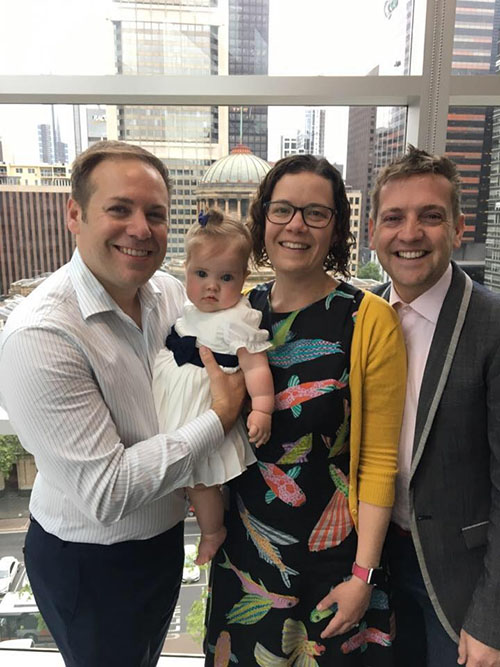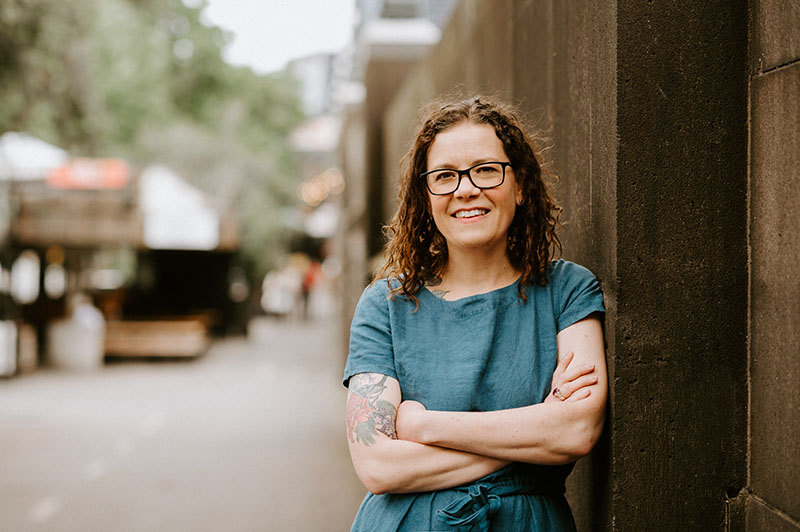The precious gift of a baby. It is rarely considered in commercial, legal or even altruistic terms … that is, unless you are UNE alumna Sarah Jefford. For the past seven years she has made such matters the focus of her busy legal practice, guided by profound personal experiences.
Sarah is one of the few specialist family creation (surrogacy and donor conception) lawyers in the country. Of the 105 surrogacy births in Australia last year, 75 were to her clients, and earlier this month she received an OAM for services to law and the surrogacy community.
It’s a community she has come to know intimately. Twice Sarah has been an egg donor and, in 2018 after having two sons of her own, she gave birth to a baby girl for two fathers.
 Sarah with the two dads and their daughter
Sarah with the two dads and their daughter
“I had a very positive surrogacy experience”
“I had a very positive surrogacy experience,” Sarah says. “I was waiting for the time when I might start grieving or struggling because giving a baby away is very complex, but that time didn’t come. However, surrogacy does pose all kinds of legal and ethical questions, and not all surrogacy, whether altruistic or commercial, is the same.”
Feeling a compulsion to tell her own story, Sarah started blogging and earned a large following for her Australian Surrogacy Podcast, which shares the perspectives of surrogates, intended parents and professionals working in the area.
“It was quite cathartic and like a therapy session; the process has allowed me to clarify my thinking around what I think makes a good surrogacy arrangement and how people need to prepare themselves for a positive experience,” she says. “I’d seen arrangements that didn’t go so well and I wanted to explain the processes and what to expect, to help educate others.”
For there is still much stigma and misunderstanding surrounding surrogacy. In Australia, it is legal so long as no money changes hands, but our state and territory surrogacy laws are not uniform and Sarah has actively campaigned for reform.
“In preparing to be pregnant again for another couple I did a lot of thinking about altruism and what it is,” Sarah says. “I got to experience pregnancy and birth again, I got to see the couple become parents and I get to see this little girl growing up. My reward is having an ongoing relationship with them.”
As well as the popular podcast, Sarah has written a guide to surrogacy and runs surrogacy sister retreats. The UNE Bachelor of Arts/Law graduate and former Duval College resident is also a powerful advocate for best-practice altruistic surrogacy arrangements here and overseas.
“My primary goal is to promote the best interests of the child and the welfare and autonomy of the surrogate,” Sarah says. “We really want the relationship between the intended parents and the surrogate to withstand the stress of what’s going on and the child to have an ongoing relationship with the birth family and any egg donors that might be involved. We do a lot of counselling work and in the pre-legal advice stage around building relationships and trust that provides the support the team needs.”
Sarah gave up a divorce law career to pursue family creation law and this interest in “the human side of law” dates back to her final-year studies at UNE. “Being a divorce kid, I could see myself in some of the family and human rights law scenarios we studied so decided I wanted to work with people and relationships,” she says. “I worked initially in Legal Aid and then the Aboriginal Legal Service before starting my own practice.”
Now she is so busy that Sarah is looking to employ staff for the first time.
“I have seen an increase in surrogacy births since marriage equality four years ago,” she says. “It was legal for gay couples to do surrogacy before that but they perhaps didn’t see themselves in the picture so much until it was legal to get married.”
More Australian babies are born overseas via surrogacy (around 250-300 each year) than here, largely due to the difficulties in finding a surrogate. But overseas surrogacy is even more complex.
“Intended parents generally have a lawyer in their destination country and my advice is more about meeting Australian laws and what is needed to have the parentage of the child recognised under Australian law, in order to bring them back to Australia,” Sarah says. “Surrogacy needs to be regulated properly, to look after everyone involved.”
About half of Sarah’s clients are gay couples or single men; the other half are straight couples or single women, and three out of four surrogacy arrangements are via existing relationships (namely friends and family members).
But it’s an expensive exercise. In the US people will spend upwards of AUS$150-200,000 on IVF, lawyers, agencies, clinic fees, the surrogate’s expenses and, because surrogacy is commercial, the surrogate’s fee. In Australia, the cost is more likely to be in the realm of $20,000-$80,000.
Sarah entered into her own surrogacy arrangement with the full support of her husband. They spend Christmases and celebrate milestones with the family she helped to create. “It’s important to her dads and to me and my partner that our kids have a relationship with the child,” Sarah says. “The children are a bit like cousins and we are part of her extended network. There’s never been a question mark of who we are; she knows she grew in Aunty Sarah’s belly. It’s important that children like her, born of surrogacy, grow up knowing their birth and genetic heritage.”
And each time she hears news of other successful surrogacy births, of the arrivals of “much-wanted and hoped for babies”, Sarah says it never ceases to make her heart sing.


